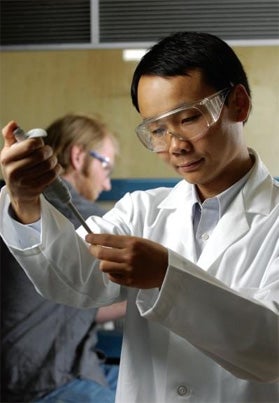Biofrontiers Institute scientist pursuing better screening method for cancer
In an 18-year study released this summer by the National Cancer Institute, widespread screening for ovarian cancer was found to be ineffective in catching the disease. The screening often did more harm than good, leading women to unnecessary surgery and the complications that often come with it.
Biofrontiers Institute scientist Hubert Yin is on the hunt for a better way to find cancer early, without harming patients in the process. Yin, an assistant professor in chemistry and biochemistry at CU-Boulder, is studying biomarkers, which are traceable substances that allow scientists to track a process within the body. Yin uses fluorescent molecules called a fluorophores, which chemically attach themselves to cells that indicate cancer is present. Their glow makes them easy to see.
Microvesicles are the objects of the fluorophores’ chemical spotlight. They are shed from the surface of cells and can actually help the spread and release of metastatic cancer cells. The presence of microvesicles is a key indicator that cancer is at work. Once fluorophores are chemically attached to these microvesicles, screening someone for cancer becomes as easy as looking for the glow. A lack of microvesicles means there is nothing for the fluorophores to attach to, which means they don’t glow. And no glow means no cancer.
“This is a great diagnostic concept,” he says. “Biomarkers like fluorophores give us efficient, noninvasive ways to detect cancer before it is diagnosed and after it is treated. Being a smaller, research-focused organization gives us an advantage over big pharmaceutical companies when it comes to designing biomedical solutions. It is easier for us to collaborate across labs, and to innovative methods that lead us in the direction of new ways of treating cancer.”


